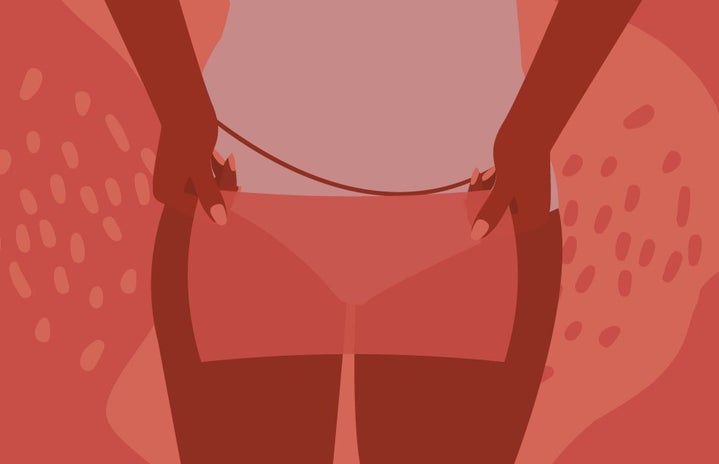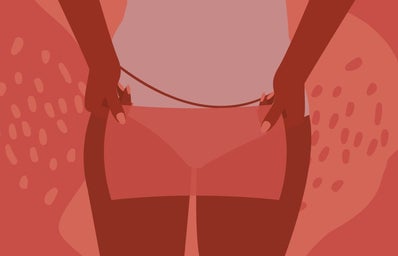He comes over. We’re excited to see each other –– he is evidently more delighted about our rendezvous (if you catch the phallus shaped drift). A warm embrace. A firm, welcoming kiss. My palms start sweating… he’s going to say it, I just know it.
“Hey, want to do it?”
My body suddenly feels tired, I say,
“Maybe later?”
He gives me a disappointed pout, but acquiesces to my request.
*1 hour later*
We’re knee deep into a movie and his hands start trailing along the contours of my body. A sense of dread sets in –– I feel guilty that dread, instead of arousal sets in.
“I’m sorry, I’m just not feeling it.”
—
Is there something wrong with me? I find myself asking this question a lot because of this recurring scenario. I used to be so easily aroused and enthusiastic about sex.
Fast forward to the present day, it seems my libido has diminished significantly. Understandably, my partner has been bothered about this too: “Do you no longer find me attractive?” he’d ask.
I’d assure him that he’s hella sexy and it’s definitely not that. On the other hand, I find it frustrating that I have to keep justifying why I don’t want to have sex –– why do I need to feel bad about it? Also, does sex necessarily have to take on such a central place in relationships –– so much so that an absence of it triggers insecurities and guilt? Perhaps there’s a better way to approach this.
“When sex doesn’t feel great, it doesn’t mean there’s something wrong with you. Maybe there’s been a change in your external circumstances or your other motivational systems (like stress) that’s influencing your sexual response. Which means that you can create positive change without changing you.”
–– Emily Nagoski, Come As You Are
As Nagoski shows, sex is much more than a physical act, it’s psychological and emotional as well. Context matters, it is important to have the space to figure out why it no longer feels great. The last thing you need is your partner breathing down your neck and triggering feelings of guilt and anger.
Instead of insisting that “men need sex”, society needs to have more open dialogues about women’s pleasure and how it is not “natural” for women to feel pain during sex— issues such as Vaginismus are important to address. Plus, women should not be expected to tolerate pain, psychological or physical, there are always treatments available. You are not broken just because you can’t have sex, there is nothing to be ashamed about. In fact, having sex out of guilt and obligation not only takes the pleasure out of it; it builds resentment towards your partner –– so don’t do it sisters and brothers!
In my case, I found it helpful to voice out how my partner’s dip in mood when I did not want to have sex stirred feelings of guilt and anxiety in me. Now, when we hit roadblocks, he’d say: “it’s okay, is there anything I can do to make you feel more comfortable?” –– this approach made it infinitely better. It assured me that my partner was there for me regardless; and it motivated me to re-evaluate my relationship with sex.
I came to realise that there were various stressors in my life that I had overlooked. Factors such as: an overwhelming workload, family drama, anxieties surrounding COVID-19, and my changing body as a result of significantly less motivation to take care of it –– were weighing down on me in insidious ways. Nagoski explains that if we don’t take concentrated efforts to resolve these stressors, they stay inside us and increase feelings of lethargy and sickness, and dulls our ability to experience pleasure in anything (not just sex).
The healing journey thus necessitated really digging in there and building the time, space, and strategies for taming these stress responses. How do we take care of ourselves, and how can we be less critical about our bodies in a culture that’s constantly expecting our bodies to “perform”? There is no one-size-fits-all solution but there are certainly guides to navigating this.
In her book Self-Compassion: Stop Beating Yourself Up and Leave Insecurity Behind, Kristin Neff describes three key guidelines to self-compassion:
1. Self-kindness is our ability to treat ourselves gently with care.
2. Common humanity is the acknowledgement that our suffering connects us with others, we’re not alone in our troubles.
3. Mindfulness is being non judgemental about whatever is happening in the moment i.e. taking a balanced view about crappy situations instead of over-identifying with your pain and suffering.
It is scientifically proven that physical activity is the most efficient strategy for calming oneself down; it can be running, walking, silly dancing in your bedroom, and basically any form of feel-good movement. Sleep, meditation, a good cry, and unburdening your feelings on someone you trust –– all of these are useful steps to creating a safe space for yourself. Of course, this is a non-exhaustive list, most importantly, we need to figure out what feels good.
In the process of this, we can find a way to involve our partners in being a part of this safe space. I think it is important for your partner to not only understand that you are battling these demons, they need to be actively present in ways that do not compromise your well-being but encourage it.
While sex is a wonderful form of intimacy, it is not the only way to be intimate. Intimacy is what makes you feel closer and connected to the other party; and it differs with each person.
Expanding our ideas of intimacy beyond physical sex can be incredibly useful to replace feelings of dread associated with sex, with warmth and excitement.
It helps to take a step back and re-evaluate what your idea of intimacy is. Does it involve intellectual intimacy whereby meaningful and philosophical discussions bring you closer to the other party? Or does having the emotional connection which makes you feel safe enough to be vulnerable, silly, and basically yourself with your partner matter more? It could even be an experiential kind of intimacy whereby engaging in different activities such as swimming together deepens your bond.
The point is, intimacy is never fixed, it differs with each individual; and may even change as you enter different stages in your life. Understanding your intimacy “language” and relaying that to your partner can significantly increase levels of attraction and arousal; but of course, it is not a straightforward process, and involves patience, kindness, and love.
Remember, sex is beyond the physicality of it; it is the last meal you ate, it is your overbearing parent, it is your stress at work, it is the conversations with your partner, your relationship with your body, your environment etc. It’s important to listen to your body when it’s not “feeling it”, and create the space to figure out what’s up. That being said, it definitely isn’t the only way to be intimate with your partner. We are all evolving beings and our relationship with our bodies are constantly changing; it’s not something to dread, but something to embrace.
To learn more about your body and it’s relationship with sex, I highly recommend reading Emily Nagoski’s seminal book on sexual well-being, Come As You Are.
Note: It is advisable to consult with a clinical doctor such as a Gynaecologist first to rule out the possibility of any genital infections. For further information on the causes of painful vaginal penetration such as Vaginismus, and the therapy-centric treatment options available in Singapore, see here.


